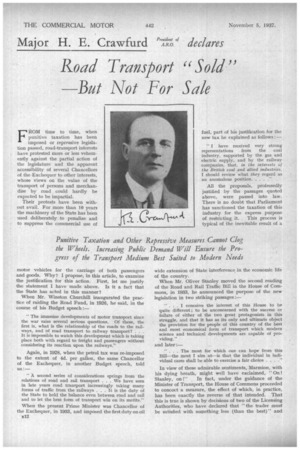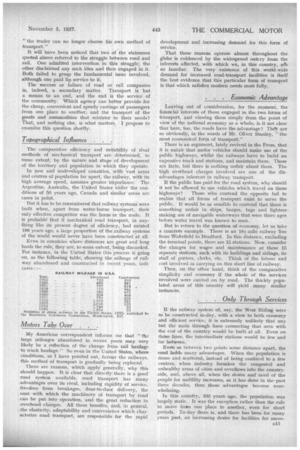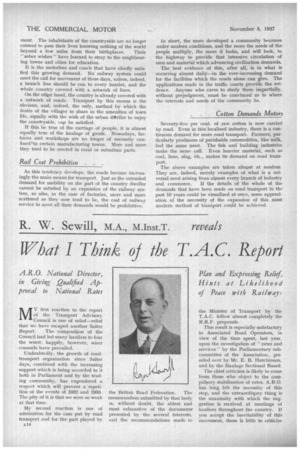Major H. E. Cra - wfurd
Page 20

Page 21

Page 22

If you've noticed an error in this article please click here to report it so we can fix it.
Road Transport "Sold" But Not For Sale
FROM time to time, when punitive taxation has been imposed or repressive legislation passed, road-transport interests have protested more or less vehemently against the partial action of the legislature and the apparent accessibility of several Chancellors of the-Exchequer to other interests, whose views on the value of the transport of persons and merchandise by road could hardly be expected to be impartial.
Their protests have been without avail. For more than 10 years the machinery of the State has been used deliberately to penalize and to suppress the commercial use of
" I have received very strong representations from the coal industry, • supported by the gas and electric supply, and by the railway companies, that, in the interests of the British coal and allied industries, I should review what they regard as
an anomalous position All the proposals, professedly justified by the passages quoted above, were passed into law. There is no doubt that Parliament has sanctioned the taxation of this industry for the express purpose of restricting it. This process is typical of the inevitable result of a motor vehicles for the carriage of both passengers and goods. Why? I propose, in this article, to examine the justification for this action. First, let me justify the statement I have made above. Is it a fact that the State has acted in this manner?
When Mr. Winston Churchill inaugurated the practice of raiding the Road Fund, in 1926, he said, in the course of his Budget speech :—
'The immense developments of motor transport since the war raise several serious questions. Of these, the first is, what is the relationship of the roads to the railways, and of road transport to railway transport? . • It is impossible to watch this development which is taking place both with regard to freight and passengers without considering its reaction upon the railways."
Again, in 1928, when the petrol tax was re-imposed to the extent of 4d. per gallon, the same Chancellor of the Exchequer, in another Budget speech, told us!- "A second series of considerations springs from the relations of road and rail transport . • . We have seen in late years road transport increasingly taking many forms of traffic from the railways . . It is the duty of the State to hold the balance even between road and rail and to let the best form of transport win on its merits."
When the present Prime Minister was Chancellor of the Exchequer, in 1933, and imposed the first duty on oil 3E12 wide extension of State interference in the economic life of the country.
When Mr. Oliver Stanley moved the second reading of the Road and Rail Traffic Bill in the House of Commons, in 1933, be announced the purpose of the new legislation in two striking passages:— " . . . I conceive the interest of this House to be quite different; to be unconcerned with the success or failure of either of the two great protagonists in this struggle, and that it has as its only and ultimate oblect the provision for the people of this country of the best and most economical form of transport which modern science and technical developments are capable of providing."
and later:— . . The most for which one can hope from this Bill—the most I aim at---is that the individual in individual cases shall be able to exercise a fair choice . . ."
In view of these admirable sentiments, Marmion, with his dying breath, might well have exclaimed, " On I Stanley, on!" In fact, under the guidance of the Minister of Transport, the House of Commons proceeded to concoct a measure, the effect of which, in practice, has been exactly the reverse of that intended. That this is true is shown by decisions of two of the Licensing Authorities, who have declared that "the trader must be satisfied with something Tess (than the best)" and "the trader can no longer choose his own method of transport."
It will have been noticed that two of the statesmen quoted above referred to the struggle between road and rail. One admitted intervention in this struggle; the other disclaimed any such idea and then engaged in it. Both failed to grasp the fundamental issue involved, although one paid lip service to it.
The success or failure of road or rail companies is, indeed, a secondary matter. Transport is but a means to an end, and the end is the service of the community. Which agency can better provide for the cheap, convenient and speedy carriage of passengers from one place to another, and the transport of the goods and commodities that minister to their needs? That, and nothing else, is what matters. I propose to examine this question shortly.
Topographical Influence . .
The comparative efficiency and suitability of rival methods of mechanical transport are determined, to some extent, by the nature and stage of development of the territory and population in which they operate.
In new and undeveloped countries, with vast areas and centres of population far apart, the railway, with its high average speed, assumes greater importance. The Argentine, Australia, the United States under the conditions of 50 years ago, Canada and similar areas are cases in point.
But it has to be remembered that railway systems were built when, apart from water-borne transport, their only effective competitor was the horse or the mule. It is probable that if mechanical road transport, in anything like its present degree of efficiency, had existed 100 years ago, a large proportion of the railway systems of the world would never have been constructed at all.
Even in countries where distances are great and long hauls the rule, they are, to some extent, being discarded. For instance, in the United States this process is going on, as the following table, showing the mileage of railway abandoned and constructed in recent years, indicates :— My American correspondent informs me that "the large mileages abandoned in recent years may very likely be a reflection of the change from rail haulage to truck haulage." So even in the United States, where conditions, as I have pointed out, favour the railways, this method of transport is gradually being replaced. There are reasons, which apply generally, why this should happen. It is clear that directly there is a good road system available, road transport has many advantages over its rival, including rapidity of service, freedom from breakages, door-to-door delivery, the ease with which the machinery of transport by road can be put into operation, and the great reduction in overhead charges. All these benefits, and, in general, the elasticity, adaptability and convenience which characterize road transport, are responsible for the rapid development and increasing demand for this form of service.
That these reasons operate almost throughout the globe is evidenced by the widespread outcry from the interests affected, with which we, in this country, aee so familiar. The very existence of this world-wide demand for increased road-transport facilities is itself the best evidence that this particular form of transport is that which satisfies modern needs most fully.
. . Economic Advantage
Leaving out of consideration, for the moment, the financial interests of those engaged in the two forms of transport. and viewing them simply from the point of view of the national economy as a whole, is it not clear that here, too, the roads have the advantage? They are so obviously, in the words of Mr. Oliver Stanley, "the most economical form of transport."
There is an argument, lately revived in the Press, that it is unfair that motor vehicles should make use of the public highways, whilst the railways have to build an expensive track and stations, and maintain thorn. These are facts, bit there is nothing unfair about them. The high overhead charges involved are one of the disadvantages inherent in railway transport.
If the public has paid for the road system, why should it not be allowed to use vehicles which travel on these highways? Those who contend the opposite fail to realize that all forms of transport exist to serve the public. It would be as sensible to contend that there is something unfair in ships, barges, tugs and lighters making use of navigable waterways that were there ages before water travel was known to man.
But to return to the question of economy, Iet us take a concrete example. There is an 18A-mile railway line from Wakefield to Bradford. In this distance, excluding the terminal points, there are 15 stations. Now, consider the charges for wages and maintenance at these 15 separate stations, each with its buildings and sidings, its staff of porters, clerks, etc. Think of the labour and cost involved in carrying on this short line of railway.
Then, on the other hand, think of the comparative simplicity and economy if the whole of the services involved were carried on by road. The thickly populated areas of this country will yield many similar instances.
. Only Through Services
If the railway system of, say, the West Riding were to be constructed to-day, with a view to both economy and efficient service, it is extremely unlikely that any but the main through lines connecting that area with the rest of the country would be built at all. Even on those lines, the intermediate stations would be few and far between.
Even as between two points some distance apart, the road holds many advantages. When the population is dense and scattered, instead of being confined to a few centres, when industry forsakes the congested and unhealthy areas of cities and overflows into the countryside, and, above all, when the desire and need of the people for mobility increases, as it has done in the past three decades, then those advantages become overwhelming.
In this country, 100 years ago, the population was largely static. It was the exception rather than the rule to move from one place to another, even for short periods. To-day there is, and there has been for many years past, an increasing desire for facilities for move ment. The inhabitants of the countryside are no longer content to pass their lives knowing nothing of the world beyond a few miles from their birthplaces. Their " sober wishes " have learned to stray to the neighbouring towns and cities for education.
It is the motorbus and coach that have chiefly satisfied this growing demand. No railway system could meet the call for movement of these days, unless, indeed, a branch line should be run to every hamlet, and the whole country covered with a network of lines.
On the other hand, the country is already covered with a network of roads. Transport by this means is the obvious, and, indeed, the only, method by which the desire of the villager to share in the amenities of town life, equally with the wish of the urban &teller to enjoy the countryside, can be satisfied.
If this be true of the carriage of people, it is almost equally true of the haulage of goods. Nowadays, factories and workshops are no longer of necessity confined 'to certain manufacturing towns. More and more they tend to be erected in rural or suburban parts.
Rail Cost Prohibitive .
As this tendency develops, the roads become increasingly the main means for transport. Just as the extended demand for mobility on the part of the country dweller cannot be satisfied by an expansion of the railway system, so also, in the case of factories, more and more scattered as they now tend to be, the cost of railway service to meet all their demands would be prohibitive. In short, the more developed a community becomes under modern conditions, and the more the needs of the people multiply, the more it looks, and will look, to the highway to provide that intensive circulation of men and material which advancing civilization demands.
• The best evidence of this, after all, is in what is occurring almost daily—in the ever-increasing demand for the facilities which the roads alone can give. The applications made in the traffic courts provide the evidence. Anyone who cares to study these impartially, without prejudgment, must be convinced as to where the interests and needs of the community lie.
. Cotton Demands Motors
Seventy-five per cent. of raw cotton is now carried by road. Even in this localized industry, there is a continuous demand for more road transport. Farmers, particularly producers of perishable commodities, like milk, feel the same need. The fish and building industries make the same call. Even heavier material, such as coal, lime, slag, etc., makes its demand on road transport. The above examples are taken almost at random They are, indeed, merely examples of what is a universal need arising from almost every branch of industry and commerce. If the details of the whole of the demands that have been made on road transport in the past 10 years could be visualized at once, some appreciation of the necessity of the expansion of this most modern method of transport could be achieved.


















































































